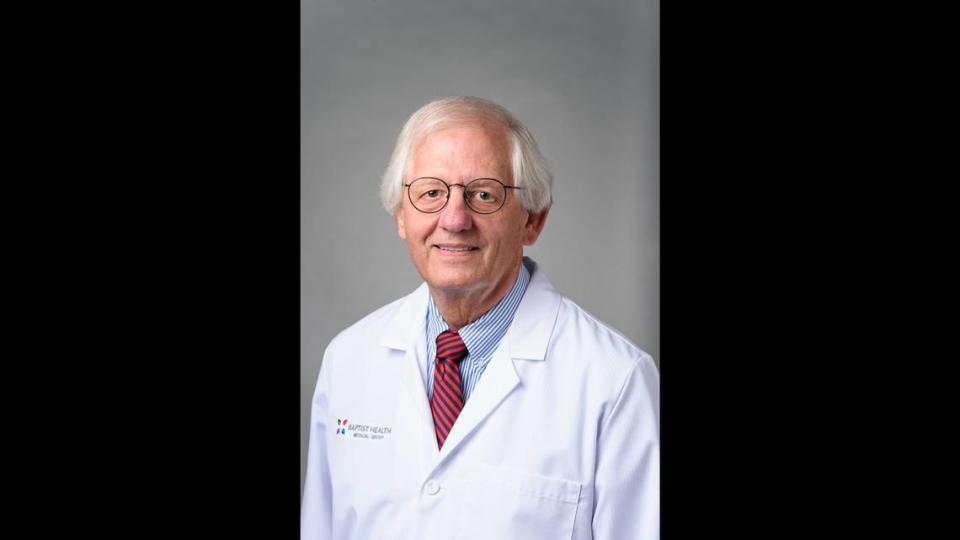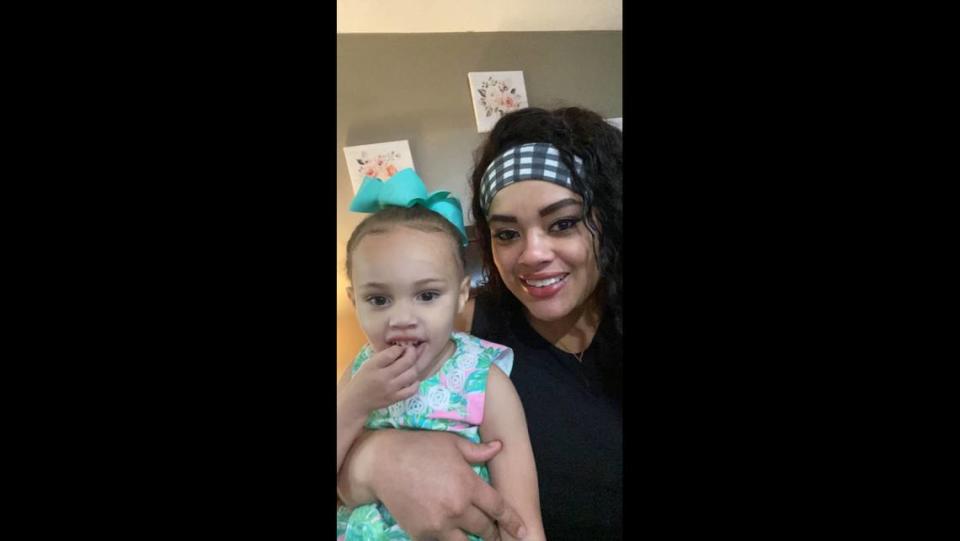‘My babies survived because of him.’ Parents remember beloved Lexington doctor.
When Joan Graves first got pregnant 30 years ago, no one could explain why she was suddenly crippled with bouts of overwhelming pain.
The Winchester woman was sent to a young doctor at Baptist Health in Lexington who was a specialist in high-risk pregnancies. Graves had a rare blood disorder mostly seen in men, so no one really knew how it affected pregnancies, only that the outcomes were bad. Dr. John Barton worked with her throughout her pregnancy, much of it spent in hospital beds hooked up to an epidural. When her son was finally born, it was the first recorded live birth by a woman with her blood disorder. She went on to have two more.
“My babies survived because of him,” Graves said. “And he wrote about my case in medical journals, and because of that work he got people to pay attention. Before, there were women out there losing babies.”

Throughout his career at Baptist Health, Barton delivered more than 2,000 babies, many of them — and their moms — facing similar dangers. Barton died on July 18 of cancer at the age of 65, leaving thousands of parents around Central Kentucky to mourn his loss and remember his care, which often continued after the births. (Graves said that after she got a hysterectomy, Barton brought smiley-faced cookies to her hospital room to celebrate.)
We all hope to leave some kind of mark on the world, but few of us get to do it in the way John Barton did, with so many living, breathing symbols of our work.
Jim and Angie Carr of Cynthiana credit Barton for their children and grandchildren. In 1992, Angie was 26 weeks pregnant with identical twin girls, but had started having contractions. She was sent to Barton’s office, where he explained that she was suffering from twin to twin transfusion, in which amniotic fluid was draining from one baby, leaving her too little, and going to the other baby, who had too much.
With Jim’s help, he drained a gallon of fluid off of Baby B and then sent it back to Baby A.
“The day that Baby A started showing she had fluid around her, he was so thrilled that it had worked, it was such an exciting time,” Angie said. She spent 40 more days in the hospital, and it felt like he rarely left her side. When Mariah and Kelsey were born by C-section at 35 weeks, they stayed a few more days and then headed home. On the day the Carrs were leaving, “he came up with tears in his eyes,”Angie said. “’I want to hold these babies,’ he told me. “If someone had told me you would be leaving this hospital with healthy babies, I would have just shook my head.”
Mariah and Kelsey were the first living set of twins to survive twin to twin transfusion, Angie said.
But the Carrs would continue to see Barton, when Angie had another set of twins, this time fraternal, and then when Kelsey Fryman herself became pregnant with twins. “I was so nervous, I called Dr. Barton’s office immediately and he called me back within 30 minutes,” Fryman said. “He told me everything would be OK.
“He was an extraordinary man,” Fryman said. “Without him, I wouldn’t be here.”
‘The corn truck doctor’
Barton was born in Fayette County to the Barton farming family, known even today for its sweet corn crop. Barton was famous at Baptist for bringing the corn crop to the hospital every year.
He graduated from Centre College in 1979, and attended the University of Kentucky for medical school. He started at Central Baptist Hospital in 1991, now called Baptist Health Lexington. He soon became an expert on pre-eclampsia, a dangerous blood pressure syndrome that affects pregnant women. He and his partners grew the perinatal program into a statewide referral center for high-risk pregnancies. When asked in 2010 what he enjoyed about his job, he said “There’s a science and art to obstetrics. The art is that it’s hands-on. You’re interacting with patients and relying on your physician examination skills. The science comes with our research.”
The stories are legion. Candace Conn was a 24-year-old woman from Flemingsburg with kidney failure and pre-eclampsia who had to be hospitalized for 100 days. Dr. Barton would visit her every morning before rounds, where they would eat breakfast and watch “The Jerry Springer Show.” He organized her baby shower at the hospital, and when they came in to get her for the C-section, he was wearing a Jerry Springer t-shirt under his scrubs.
Hailey Conn is now 21.
“He was a wonderful, wonderful, wonderful man and if it weren’t for him, I wouldn’t have my child here,” Candace Conn said.
Jenny Tucker’s twins were born under Dr. Barton’s watch, but after they were taken to the NICU, she could tell something was wrong. She asked staff to check her again, but she looked healthy. Finally, her mom got them to page Dr. Barton.
“The second he came in he knew something was wrong ... they did an EKG and realized I was in heart failure,” Tucker said. “Basically without him I wouldn’t have made it through the night.”
Barton is survived by his wife, Lisa and his son, Will and daughter Lucy. Will Barton said that his father managed to somehow tend to all his patients and spend time with his family. “I don’t know how he did it,” Will said. “My room growing up was above the garage — I remember hearing it at 3 or 4 o’clock in the morning all the time.”
The family hasn’t yet planned any arrangements for a very Bartonian reason: Will’s sister, Lucy, lives in Eugene, Ore., and is 38 weeks pregnant. “He was adamant about my sister not flying before the baby was due,” Will said. So their mother will fly out to be there for the birth, and when Lucy and the baby can travel, they will plan a funeral for everyone who loved him.
‘I thank him so much’
But outside of his family, friends and many fans, there may not be anyone mourning Dr. Barton as deeply as a Baptist Health nurse named Laila Graves.

Five years ago, she was 23 weeks into a very normal pregnancy, when one night on duty she took her blood pressure. The alarm beeped as dangerously high. She did the other arm, same problem. She was sent down to obstetrics, where plans were soon made to transport her to UK, because Baptist doesn’t deliver babies under 24 weeks.
Then Dr. Barton came in. He listened to her speak, and said they still needed her to go to UK.
“I told him, I’m not going to UK,” Graves said. “There’s no way I’m going to live with the pain if I survive and my child doesn’t, so you’re going to have to come up with a plan to keep us both here.”
So he did. Graves began a multi-week saga of hospitalizations and bed rest and different medicine combinations to try to lower her blood pressure. It wasn’t pre-eclampsia, but they couldn’t figure out exactly what the problem was. At one point, he was at a conference in Texas, discussing her case with a colleague and they came up with an idea. He called back to the hospital and put Graves on a diuretic, which slowly began to work. She made it to 20 weeks. They kept experimenting, and pretty soon, she had gotten to 37 weeks.
“Sometimes you have a stereotype in your mind that people like him — I would refer to him as a genius — don’t have that religious component,” Graves said, beginning to sob. “He told me at 37 weeks, ‘you should have never been able to make it medically, scientifically to full term. In my whole career I’ve never seen it before. You must have had a higher power looking out for you and that baby.’”
“I said, ‘yes, I prayed for my baby every day.’ He looked at me, and he said: ‘He was listening.’
“I just thank him so much ... I’m so grateful to God that I was here and that he was here because I believe if I were anywhere else I would not have the same outcome.”
Alaya is now five years old.
“She’s here today because of Dr. Barton,” Graves said. “A man like this you think will live forever, but I truly believe he was called because he did what he was supposed to do. He saved thousands of people, thousands of babies.
“He was a beautiful man.”

